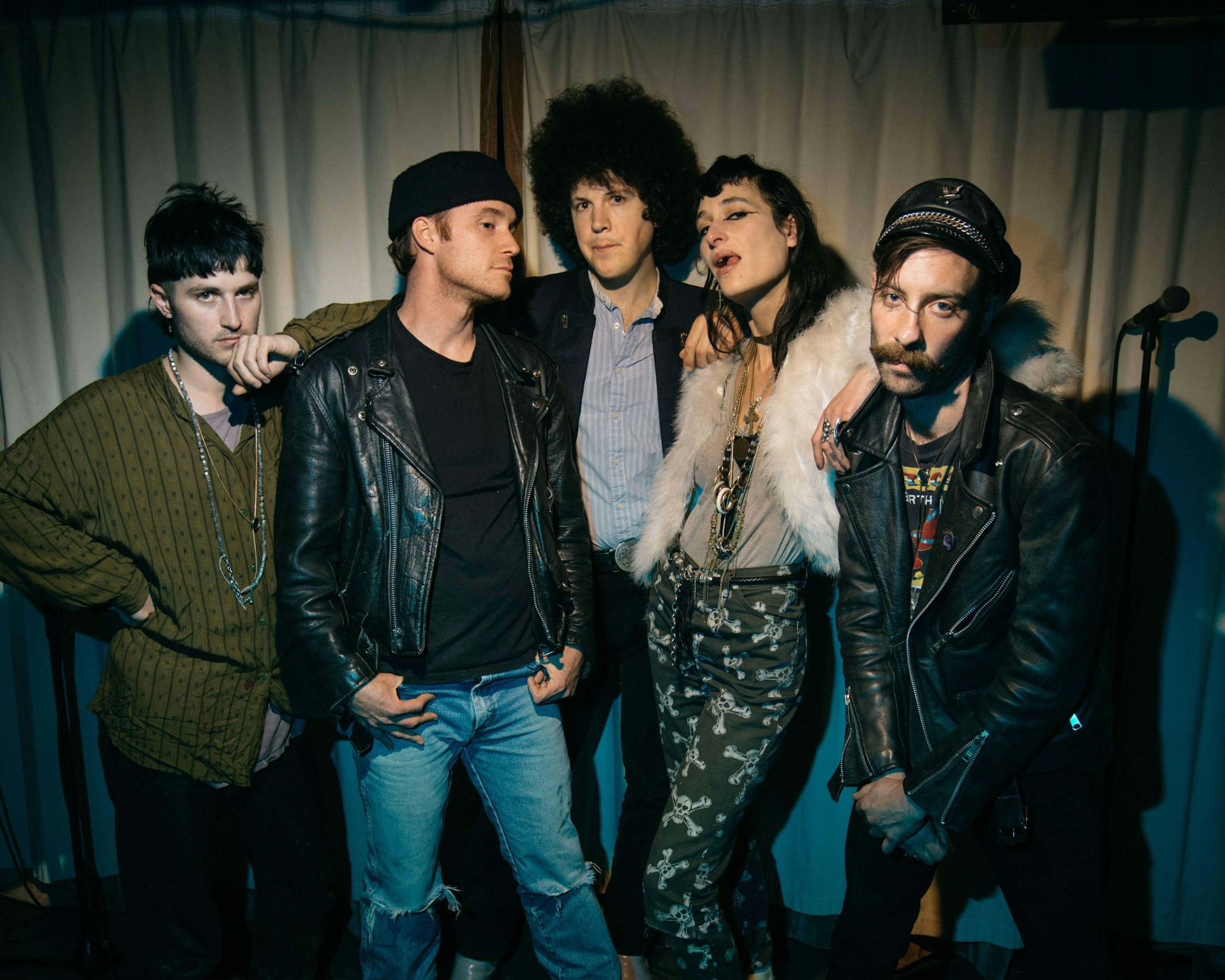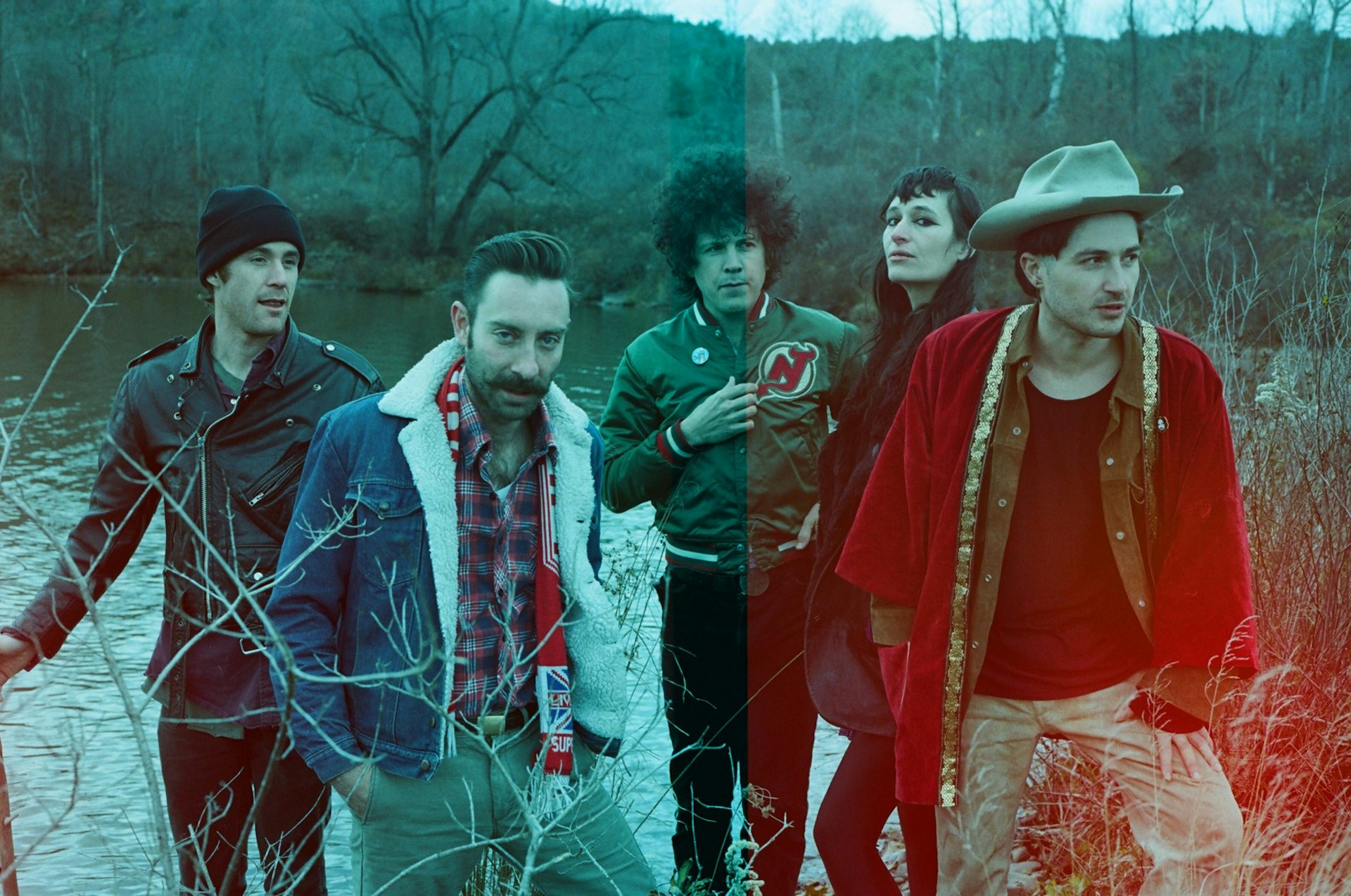
Too hippie to be punk, too punk to be hippie
- Text by Biju Belinky
The Black Lips have never been known for being particularly predictable. Quite the opposite, really. In their early DIY years they became known for their rather wild stage behaviour that included, but was not limited to, throwing up, making out and plenty of nudity. Now, after 18 years together, they’ve traveled way further than most bands, almost got arrested in India, and, although controversy never seems to stay at bay for long, they continue forging their own path, making music that bridges the gap between harsh punk rock and psychedelia.
Satan’s Graffiti or God’s Art? arrives after a three-year hiatus and plenty of soul-searching, guided by Sean Lennon. The five piece band, which had a serious shake up before they got to work on this album, remains fronted by Cole Alexander and Jared Swilley, who formed the Black Lips together back in their schooldays.
Bassist Jared says it’s his favourite record so far – the one he always wanted to make.
This evening, we aren’t talking about anything particularly controversial – more about touring and the hidden connections between punk performers and church preachers, the two unlikely things that inspired Jared to become a musician in the first place.
Since you first started out, how do you see the Internet affecting the DIY scene? Has the shift from analogue to digital changed your experience as a band at all?
It’s weird because when we were in the real pre-internet days we were really tiny, so we had to put together our own press packs; we’d be sending out manila folders to all the clubs. None of us had cellphones either.
Even now, though, we don’t use the Internet that much, compared to all the other aspects of everything we do. We’ve never been too social media-based. Record sales kind of suck – the way you make money has definitely changed. I guess it’s good and bad, mostly good, but in a weird way, it means you have to do things even more DIY – like if I was a kid starting out right now I’d do everything on Bandcamp or whatever and sell all my own stuff. But I’m barely literate when it comes to the internet.
What was your first introduction to music? What made you go like “Hell yeah, this is what I want to do”?
I’m sure it was a number of things, but the main one that sticks out is when I saw [documentary] The Decline of Western Civilization …on the LA punk scene, when I saw The Germs doing what they did.
It was a mixture between that, and the first time a friend of mine’s older brother showed me The Sex Pistols. Those two were the ones. I just remember being floored. None of them seemed to be technically talented at all, so it seemed to me like something I could start working on immediately. For me it was more about the attitude and how they just looked so cool. Something about that was really captivating.
Was there a scene at all in Atlanta?
No, there wasn’t, really. There was all the mohawk stuff, the hardcore punks and there was a skinhead scene, but I wasn’t into all that. I like punk, but it had to have a weird edge, or like a weird artsy part of it. A lot of the scene that was around was kind of too macho for me. I mean, The Germs seemed scary and tough, but you’d see their interviews and they’re weirdos. They’ve got really cool lyrics and it’s not just meathead stuff. You could tell they were interesting: interesting fuck-ups.

Photo by Ben Rayner
Do you feel like these bands that stood out to you influenced the you wanted to perform?
A little bit! I was always into the performance aspect of it, even growing up. My dad’s a gospel preacher, and so was my grandad and all my uncles and stuff. Those were really wild sermons – I wasn’t particularly into the message so much, but I was impressed by the showmanship of the whole thing, speaking in tongues and things like that.
You can’t really incorporate that type of intensity into a rock n’roll show, because you’re not singing about what people think is eternal salvation or damnation. But if you can get a fraction of that type of intensity… that was always something really inspiring to me.
Wait a second, your dad is a gospel preacher? How does he feel about your music?
No tension at all there. He loves it! He has an interesting story himself, I mean, he was a mega church preacher, but he came out to his congregation, so he was defrocked and got a lot of flak for that. But even when he was preaching, he wasn’t one of those “hellfire and damnation!” preacher types, it was way more positive. He’s always been very supportive. He’s cool.
People have called the music you guys make a million different labels. Did you ever feel like any of those fit?
I just go with “rock n’roll”, really. Over the years we’ve just started telling people that we were “flower punk”. Then we noticed other bands started using that, so I guess it kind of caught on.
By flower punk, you mean punk with a hint of psychedelia?
Yeah – too hippie to be punk, too punk to be hippie.
You guys tour loads. Do you feel like going to all these different places has given you a different perspective on music?
To a degree! I learned some really cool guitar scales from a kid in Egypt, and when we were in Iraq we saw some really different instruments. But it’s crazy how Westernised the entire world is, especially when you get into pop music and the scene.
I guess it has to do with the internet but also with class… kids all over the world who can afford to go to university, or buy a guitar, or go to shows, tend to be a lot more Westernised. I don’t know about music itself, though… I’m not that great at playing, so I like listening to new stuff, but it’s hard for me to learn new things. I’m not all that talented.
I guess I was more curious about your perception of how your music, being part of a subculture, is experienced by people all over the world. Like, seeing how the public in America relates to the songs must be different from seeing how someone in Brazil does.
The reactions we get everywhere are surprisingly similar. For example, before we went to Japan for the first time, everyone I know who toured over there said the public would be very polite – not super agitated at all. But then when we got there, the crowd looked exactly the same as everywhere else – people were crowdsurfing and all that. I don’t know if that’s because of the style of music we play.
One big thing I experienced that was really cool was when we played in Alexandria, Egypt. There was this crowd of around 200 or 300 people, this whole skate team came… The promoter was telling me that for most kids there, it was their first punk show, and I could tell. They were starting to get rowdy, but they were also learning how to mosh while the gig was happening, so at first it started as kind of pogo-ing. That was the one of the times I thought, “Wow, we’re playing the first punk show that all of these kids have ever seen.” That was pretty great.
You also got into quite a bit of trouble during touring, like in India. Were you ever scared?
India was pretty scary. That was a big misunderstanding and also the first time on tour that I was worried about us going to jail – we just didn’t know.
We weren’t going there to be offensive at all. We did a bunch of shows and the local tour manager said, “You guys can do whatever you want; it looks like you’re bored out there.” We were taking care since we didn’t want to cross a line. But he said “Do whatever you want” and… we kissed each other. I guess that, because we were playing at an university, people freaked and we had to flee.
I mean, they’d seen what we were all about since they invited us over. We asked if we needed to be on any special behaviour and were told “Just do your thing”. But that reaction could’ve been university officials flipping out or the cops. I don’t know.
I’m really curious about the album title, Satan’s Graffiti or God’s Art, coupled with the current Twitter bio “psychedelic satanic scientologist power”. What’s that all about?
Someone else came up with that – I wish I could remember where I saw it. It was in a church. Churches in the South have these marquees outside the buildings – sometimes they’re pretty normal, but sometimes they’re really crazy, and they’ll say what the sermons are about that Sunday. I saw one somewhere in North Georgia while I was driving and I was like, “Woah, that’s amazing.” I’m actually still really curious about what that sermon would’ve been about, really.
They sound like a very surreal thing to see just in the middle of nowhere.
There’s one two houses down from me right now. Actually there’s three on my block. But usually those are pretty mundane and just say like…“You can do all things through Christ Jesus” and stuff like that. You have to go further out to see the really bizarre ones.
What do you feel is the driving force behind this album?
It’s a little bit like desperation. We had a bit of a line-up change – it was amicable and everything, but there was a total shift, we were in-between labels… Sean Lennon kind of came and rescued us because we didn’t know what we were doing. The album is something we had to do, because it was either we do it and make a great record, or we’re done.
Not asking to pick favourites or anything, but which song in the album are you most proud of?
Crystal Night, which I learned today is ‘controversial’.
Why is it controversial?
Because it’s an anti-nazi song, and apparently that’s controversial now – being anti-nazi. It’s a duet I did with our saxophone player, Zumi. I’m really obsessed with musicians like Joe Meek and ’60s girl groups, where they do these super tragic, heartbreaking love songs…like ‘Leader of The Pack’ by The Shangri-Las, where the guy dies on his way to pick her up to the prom.
I was trying to think of the most tragic love story. Zumi is Jewish; I’m Christian. The story is about two people who meet each other in Germany the night the Nazis start taking over, and they fall in love. The next day, she gets taken away by the Nazis. Throughout the song they talk about how they don’t know if their lover is alive or not.
I thought it was the most heartbreaking love story to write about, and it also says that the Nazis suck and they killed the person I loved. I didn’t think that was too controversial, but I guess… I don’t know. It’s hard not to be controversial even when you’re trying not to be.
Satan’s Graffiti or God’s Art? by Black Lips is out 6 May on Vice records.
Enjoyed this article? Like Huck on Facebook or follow us on Twitter.
